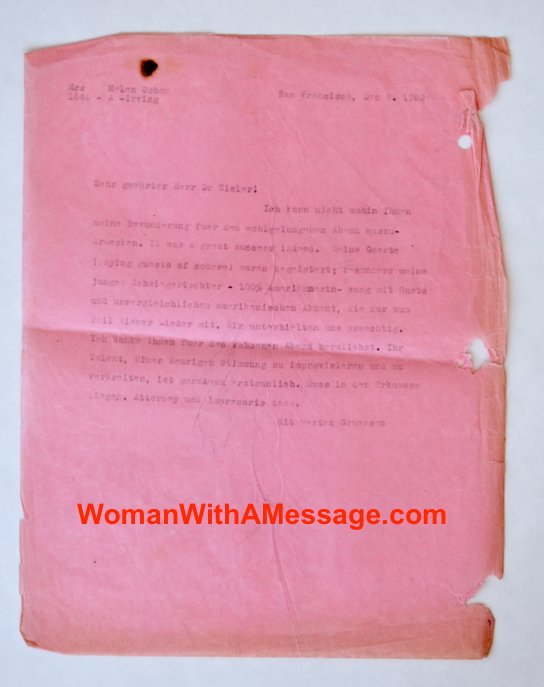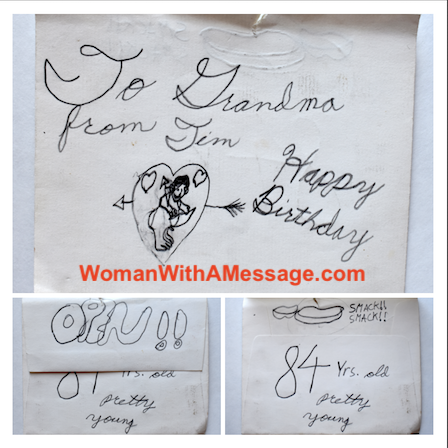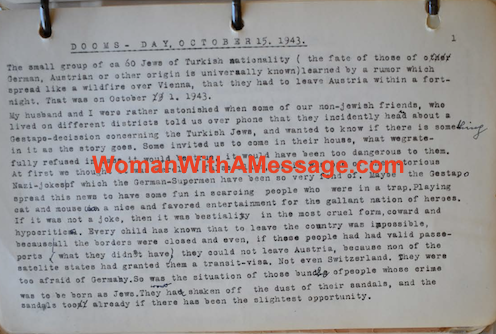The small group of about 60 Jews of Turkish nationality (the fate of those of German, Austrian or other origin is universally known) learned by a rumor which spread like a wildfire over Vienna that they had to leave Austria within a fortnight. That was on October 1, 1943.
My husband and I were rather astonished when some of our non-Jewish friends, who lived in different districts told us over the phone that they incidentally heard about a Gestapo-decision concerning the Turkish Jews, and wanted to know if there is something in it as the story goes. Some invited us to come in their house, which we gratefully refused in case it would be true, it would have been too dangerous to them. At first, we thought it was merely a false alarm, or it was one of the notorious Nazi jokes of which the German-Supermen have been so very fond of. Maybe the Gestapo spread this news to have some fun in scaring people who were in a trap. Playing cat and mouse (a nice and favored entertainment for the gallant nation of heroes). If it was not a joke, then it was bestiality in the most cruel form, coward and hypocrite. Every child has known that to leave the country was impossible, because all the borders were closed, and even if those people had had valid passports (which they did not have), they could not leave Austria, because none of the satellite states had granted them a transit-visa. Not even Switzerland. They were too afraid of Germany. So was the situation of this bunch of people whose crime was to be born as Jews. They would have shaken off the dust of their sandals, and their sandals too already if there had been the slightest opportunity.
Who knows? Perhaps there was still a grain of verity in that Tartar-tidings. In spite of the early hours, my husband and I found the ante-room to the office of the Consulate General crowded with people who got the alarming news as we got acquainted with the Hiobs-message [Hiobsbotschaft = terrible news]. The inquiries showed that indeed such an ukase was issued, but that was not for the first time, one of the Vice-Consuls said, indicating that Berlin for 5 years harped on this subject, and nothing ever happened to the Jews of Turkish origin. “Food never will be eaten as hot as it cooked.” [may be a version of a line attributed to Heinrich Müller, a high level Nazi official: “Soup is never eaten as hot as it is cooked.” in The SS, Alibi of a Nation, 1922-1945 by Gerald Reitlinger] The consolation was well-meant and sincere, but not too convincing. The Consul General showed much consideration and would have liked to help, if help would have been possible. His countenance expressed Goethe’s: Noble man should be helpful and kind.
With Hitler’s entry into Austria, the Turkish Embassy has ceased to be a beautiful building, in the same room was the Turkish Consulate General established. The Diplomatic staff and the office personnel were mostly the same, but the Turkish Ambassador was recalled, and a Consul-General appointed, who unfortunately had not the same plenary authority as the ambassador. All directions came from Berlin. The small number of Turkish Jews were the rest of one, once-upon-a-time big and rich colony, which was very significant for the Export and Import Trade between Turkey and Austria before and after World War I. The majority of the well-to-do Oriental Rug Dealers, brokers, and importers said good-bye to Vienna as soon as Hitler came to power in Germany in 1933.
Actually, that small bunch of Turkish Jews was protected by the Turkish authority in Vienna from 1938 until 1941, in spite of Hitler’s parole: it was an act of humanity, de facto the God-forsaken group was stateless by a decree of the Turkish Government, saying that all the Turkish subjects living in foreign countries who have not entered Turk territory became expatriated. This decision was retrospective because nobody in Vienna knew about it, otherwise they would have had plenty of time to leave Austria; their children were born there and attended Viennese schools, and all were over-optimistic; like the Austrian people, they didn’t believe in Hitler’s conquering Austria. That was their fatal mistake.
My husband was furnished with his military papers showing that he served in the Turk army under Kemal pasha of Gallipoli.
The Consul General intervened on their behalf as often as any necessity occurred, except in residential cases, viewing that this would have been an interference in affairs of the German authorities. Until June 1941, the T.J. [Turkish Jews] were not much more bothered than those Austrian “Aryans” known to the Gestapo as Non-Nazis. They did not have to wear the yellow star on their garments, could even stay in a park if they wanted to, could ride the street car, privileges the native Jews didn’t have. The discrimination consisted of ration cards for food-stuffs. The Jews received cards with the ominous letter “J” which exempted them from the purchase of so-called valuable victuals such as eggs, “tea” (substitute of course) which was not too hard, because the receiver of ration cards without “J” didn’t get those items either because they were available on paper only. They were also exempted from the ration-card for smoking materials.
With the entry of the USA into the war, things changed. The first observance of the Hitler doctrine “Jew is Jew” was put into practice, that by decree the T.J. were to be evicted without delay. The Wohnungsamt — that branch of the Gestapo which had evidence about any place called “habitation” — badly needed places for the invaders from the Reich (Germans who invaded Vienna locust-like). It was their business to find a roof over their head – if not ,the Gestapo had moved away their furniture. They were only allowed to live in the Leopoldstadt — the Viennese Ghetto — which had a long time ago ceased to be a Ghetto. The former inhabitants, if they were still alive, populated the concentration camps. Several families had to live in 2-3 room apartments with one kitchen, bedrooms separated by a folding screen or curtain. Such mass quarters were occupied by people who had not been on speaking terms before. The number of people who had to live in such a close community depended on square measures.[?]
Incompatibility grows quickly in such a dense and involuntary Wohngemeinschaft [shared flat/communal living], and in such a nerve-racking time even with friends. That life was hell, but compared with the existence fate had in store for them, it was paradise.
That the boisterous, demanding Austrian people disparaging “brothers” from the Reich were not warmly welcomed by some landlords was no consolation to those who had to give up their homes in their favor.
For two weeks life went on as before, only that the frightened people idled in the ante-room of the Consulate, too afraid to be on the street or in “their homes”. This building was extraterritorial and the arm of the Gestapo couldn’t fetch them as long as they were there.
On one of these exciting days even when no arresting had taken place — the calm before the storm — my husband said to me: “You traveled a lot with the children; several times you took Family-passports. You even had a Tev [?] Have you kept them? I had, and my husband went to the Consulate again. He treasured and said that it would be possible for me to get a passport to enter Turkey but not for him. I was a Turkish-Subject (subject, not citizen) by marriage, married in Vienna and registered as Turkish. I refused to leave my husband alone. Our children were saved and at this time fortunately American Citizens already, my son — we learned from the last letter delivered to us — enlisted in the army.


































